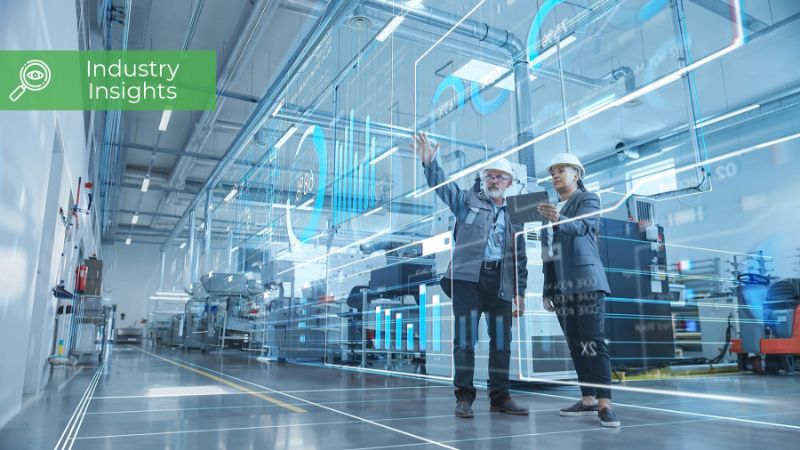Harnessing AI for Industrial Recruitment: The Era of Smart Factories
Data has become a cornerstone of modern industrial processes, transforming how factories operate and optimize their output. Today, nearly every aspect of production is measured, analyzed, and fine-tuned to enhance performance, quality, and security. This evolution has brought with it an increasing demand for new skills and competencies across the industrial sector.
“The industrial sector has seen a revolution over the last decade with the influx of data into every process, enhancing performance, quality, and security. This shift is altering talent requirements dramatically,”
— Godefroy de La Bourdonnaye, Leader of the Global Industrial Practice Group at InterSearch Worldwide (International Director of InterSearch France, Grant Alexander)
These trends and their implications were central topics at the recent Industrial Practice Group meeting in Geneva, hosted by InterSearch Switzerland. Members explored the broader impact of AI on recruitment, discussing how the rise of smart factories is reshaping workforce needs.
The Rise of Data in Industrial Operations
Over the past decade, the need for roles like industrial software specialists and 3.0 factory designers has grown dramatically. Even data analysts, who were traditionally focused on marketing and web-related tasks, are now pivotal in processing and interpreting the vast quantities of data generated by next-generation production equipment.
However, as industrial tools become more interconnected, another critical role has emerged: Industrial IT Security specialists. These professionals are essential for safeguarding against cyber-attacks and preventing costly production shutdowns caused by digital threats.
From Data-Driven to AI-Driven: The 4.0 Factory Revolution
While data has transformed industrial processes over the past decade, we have now entered a new era with the advent of 4.0 factories. These facilities are not just connected but AI-enabled, allowing for real-time, predictive decision-making. AI technology enables:
Maximizing productivity by optimizing rotation cycles.
Enhancing agility in multi-product assembly lines and manufacturing units.
Reducing downtime with predictive maintenance and smarter operations.
However, these advancements pose significant challenges for industries. Companies must upskill their existing workforce to handle these new technologies, recruit talents with expertise in AI and industrial applications, and often rely on external consulting experts to bridge immediate skill gaps and train internal teams.
Recruitment Challenges in the Era of AI
The shift to AI-driven factories has intensified the war for talent in the industrial sector. The supply of professionals with expertise in both AI and industrial operations remains limited, leading to increased competition among employers.
Adapting Recruitment Strategies
Industries need to rethink how they attract, evaluate, and onboard talent to stay competitive. This includes:
1. Updating Job Descriptions
Job postings must accurately reflect AI-related skills and competencies, such as:
Machine learning and data analysis.
IoT integration expertise.
Proficiency in industrial cybersecurity.
2. Broadening Candidate Pools
Traditional hiring approaches may fall short. Companies should look beyond industry-specific experience to candidates with transferable skills, such as data scientists, software engineers, and IoT developers.
3. Reskilling and Upskilling the Workforce
Reskilling initiatives can help current employees adapt to AI-driven processes. This approach often bridges the skills gap faster and more cost-effectively than external hiring.
4. Fostering Partnerships with Educational Institutions
Collaborating with universities, vocational schools, and online training platforms can create pipelines for emerging talent equipped with AI and data science expertise.
Turning Challenges into Opportunities
While the integration of AI into industrial operations presents significant recruitment challenges, it also offers opportunities for forward-thinking companies to stand out. By embracing AI as both a technological and workforce transformation, industries can position themselves to lead in their respective markets.
Executive search firms play a critical role in this transformation, guiding clients to adapt their recruitment strategies, identify top talent, and invest in workforce development initiatives. When part of an international network such as InterSearch, these search firms also have a unique advantage: the ability to access global talent pools. This enables them to connect clients with top-tier candidates and experts wherever they may be, a critical advantage in industries experiencing a talent shortage for AI-related roles.
“The industrial sector’s future lies in embracing AI not only as an innovation but as a catalyst for workforce evolution. Firms that prioritize these skills will gain a competitive edge as they navigate this transformation.”
— Godefroy de La Bourdonnaye, Leader of the Global Industrial Practice Group, InterSearch Worldwide.
